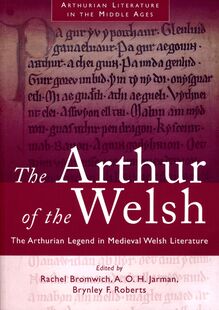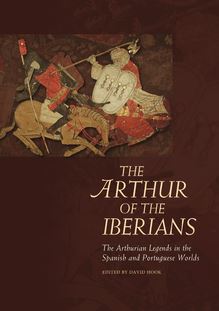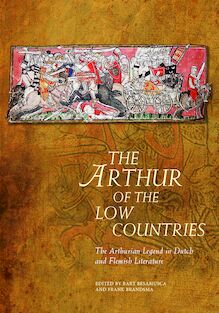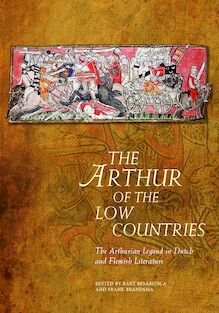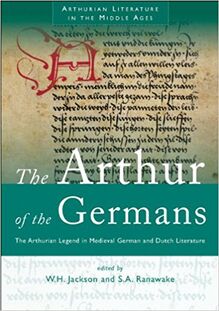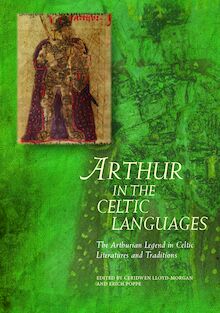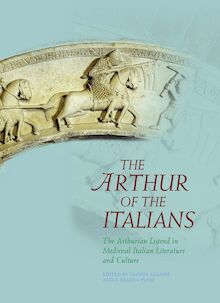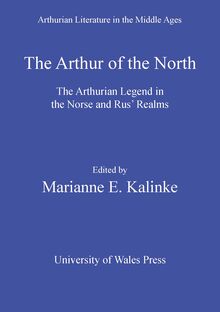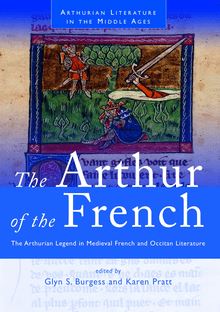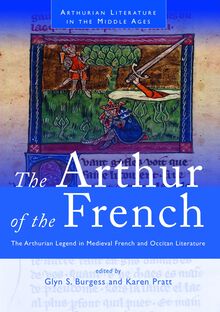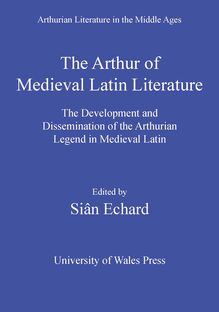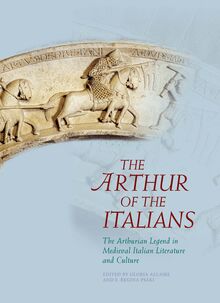-
 Univers
Univers
-
 Ebooks
Ebooks
-
 Livres audio
Livres audio
-
 Presse
Presse
-
 Podcasts
Podcasts
-
 BD
BD
-
 Documents
Documents
-
- Cours
- Révisions
- Ressources pédagogiques
- Sciences de l’éducation
- Manuels scolaires
- Langues
- Travaux de classe
- Annales de BEP
- Etudes supérieures
- Maternelle et primaire
- Fiches de lecture
- Orientation scolaire
- Méthodologie
- Corrigés de devoir
- Annales d’examens et concours
- Annales du bac
- Annales du brevet
- Rapports de stage
La lecture à portée de main
Vous pourrez modifier la taille du texte de cet ouvrage
Découvre YouScribe en t'inscrivant gratuitement
Je m'inscrisDécouvre YouScribe en t'inscrivant gratuitement
Je m'inscrisEn savoir plus
Vous pourrez modifier la taille du texte de cet ouvrage
En savoir plus

Description
This first comprehensive treatment of Arthurian literature in the English language up until the end of the Middle Ages is now available for the first time in paperback. English people think of Arthur as their own – stamped on the landscape in scores of place-names, echoed in the names of princes even today. Yet some would say the English were the historical Arthur’s bitterest enemies and usurpers of his heritage. The process by which Arthurian legends have become an important part of England’s cultural heritage is traced in this book. Previous studies have concentrated on the handful of chivalric romances, which have given the impression that Arthur is a hero of romantic escapism. This study seeks to provide a more comprehensive and insightful look at the English Arthurian legends and how they evolved. It focuses primarily upon the literary aspects of Arthurian legend, but it also makes some important political and social observations.
W.R.J. Barron, Introduction; Ceridwen Lloyd-Morgan, The Celtic Tradition, * W.R.J. Barron, Francoise le Saux, Lesley Johnson, Dynastic Chronicles; * James P. Carley, Interchapter A: Arthur in English History; * Catherine Batt, Rosalind Field, The Romance Tradition; * Karen Hodder, David Burnley, Lesley Johnson, Carole Weinberg, Dynastic Romance; * Maldwyn Mills, Elizabeth Williams, Flora Alexander, Rosamund Allen, W.R.J. Barron, Chivalric Romance; * Juliet Vale, Interchapter B: Arthur in English Society; * Gillian Rogers, Diane Speed, David Griffith, John Withrington, Folk Romance; * P.J.C. Field, Sir Thomas Malory’s ‘Le Morte Darthur’; Chris Brooks, Inga Bryden, The Arthurian Legacy; * John Thompson, Postscript: Arthurian Literature and its Public.
Sujets
Informations
| Publié par | University of Wales Press |
| Date de parution | 15 novembre 2020 |
| Nombre de lectures | 0 |
| EAN13 | 9781786837417 |
| Langue | English |
Informations légales : prix de location à la page 0,1500€. Cette information est donnée uniquement à titre indicatif conformément à la législation en vigueur.
Extrait
THE ARTHUR
OF THE ENGLISH
ARTHURIAN LITERATURE IN THE MIDDLE AGES
II
THE ARTHUR OF THE ENGLISH
THE ARTHURIAN LEGEND IN MEDIEVAL ENGLISH LIFE AND LITERATURE
edited by
W. R. J. Barron
Revised edition with an additional Postscript
© The Vinaver Trust, 1999, 2001
First published 1999
New edition in paperback 2001
Reprinted 2011
All rights reserved. No part of this book may be reproduced in any material form (including photocopying or storing it in any medium by electronic means and whether or not transiently or incidentally to some other use of this publication) without the written permission of the copyright owner. Applications for the copyright owner’s written permission to reproduce any part of this publication should be addressed to the University of Wales Press, University Registry, King Edward VII Avenue, Cathays Park, Cardiff, CF10 3NS.
www.uwp.co.uk
British Library CIP Data
A catalogue record for this book is available from the British Library
ISBN: 978-0-70832-449-3
eISBN: 978-1-78683-741-7
The publisher has no responsibility for the persistence or accuracy of URLs for any external or third-party internet websites referred to in this book, and does not guarantee that any content on such websites is, or will remain, accurate or appropriate.
Cover image: The priest Layamon writing; Cotton Caligula A. IX, f.3 by permission of the British Library
PUBLISHED IN CO-OPERATION WITH
THE VINAVER TRUST
The Vinaver Trust was established by the British Branch of the International Arthurian Society to commemorate a greatly respected colleague and a distinguished scholar
Eugène Vinaver
the editor of Malory’s Morte Darthur. The Trust aims to advance study of Arthurian literature in all languages by planning and encouraging research projects in the field, and by aiding publication of the resultant studies.
ARTHURIAN LITERATURE IN THE MIDDLE AGES
I The Arthur of the Welsh , Edited by Rachel Bromwich, A. O. H. Jarman and Brynley F. Roberts (Cardiff, 1991)
II The Arthur of the English , Edited by W. R. J. Barron (Cardiff, 1999)
III The Arthur of the Germans , Edited by W. H. Jackson and S. A. Ranawake (Cardiff, 2000)
IV The Arthur of the French , Edited by Glyn S. Burgess and Karen Pratt (Cardiff, 2006)
V The Arthur of the North , Edited by Marianne E. Kalinke (Cardiff 2011)
VI The Arthur of Medieval Latin Literature , Edited by Siân Echard (Cardiff, 2011)
PREFACE
When, some years ago, the Vinaver Trust considered revising the standard history of its academic field, Arthurian Literature in the Middle Ages (ed. R.S. Loomis, Oxford, 1959), the authors of the opening chapters on Celtic texts were the first to be approached. Their feeling was that the passage of time and the advance of scholarship made necessary a more fundamental revision than was possible within the original single-volume format. The book had served several generations of students well, but the Trustees were persuaded that the time had come for a more fundamental approach to Arthurian literary history.
ALMA, as it appeared in the Abbreviations to a hundred volumes, had reflected its editor’s professional interests closely and, even within the limitations of a single volume, given a rather narrow picture of Arthurian studies. Changing perspectives, the accumulation of scholarship and the more flexible technology of publishing now make possible a fuller record. The basis of the volumes listed on the facing page is cultural rather than purely linguistic, as more appropriate to a period when modern nationalism, and in many cases modern nation states, had not yet evolved. Each takes into account extraneous influences and includes some texts which the influence of the mother culture carried into the wider world.
Each volume in the series is primarily addressed to students of the individual culture in question, but also to those of other cultures who, for the appreciation of their own Arthurian literature, need to be aware of the manifold forms it took in the wider world and of interactions between various expressions of the legend. With this dual readership in mind, the text has been confined to a statement of current received opinion as individual contributors see it, concisely expressed and structured in a way which, it is hoped, will help readers to appreciate the development of Arthurian themes within the particular culture. Tangential issues, academic controversy, and matters of documentation, more likely to be of scholarly interest, are confined to the notes.
Within this remit, the editors have had complete control over their individual volumes. They themselves would admit that they have not ensnared that rare bird, the Whole Truth of the Arthurian legend, and that in time a new survey will be needed, perhaps on a different basis. But if, for the moment, they have allowed others to catch a glimpse of that universal phoenix, the Arthurian myth, through the thickets of academic speculation, they will feel that they have done what was presently necessary.
W.R.J. Barron
CONTENTS
Introduction
1 The Celtic Tradition
Ceridwen Lloyd-Morgan
2 Dynastic Chronicles
W. R. J. Barron, Françoise Le Saux, Lesley Johnson
Interchapter A: Arthur in English History
James P. Carley
3 The Romance Tradition
Catherine Batt, Rosalind Field
4 Dynastic Romance
Karen Hodder, David Burnley, Lesley Johnson, Carole Weinberg
5 Chivalric Romance
Maldwyn Mills, Elizabeth Williams, Flora Alexander, Rosamund Allen, W. R. J. Barron
Interchapter B: Arthur in English Society
Juliet Vale
6 Folk Romance
Gillian Rogers, Diane Speed, David Griffith, John Withrington
7 Sir Thomas Malory’s Le Morte Darthur
P.J.C. Field
8 The Arthurian Legacy
Chris Brooks, Inga Bryden
Abbreviations
Notes
Postscript : Authors and Audiences
John J. Thompson
Reference Bibliography
THE CONTRIBUTORS
FLORA ALEXANDER is a Senior Lecturer in English at the University of Aberdeen. A regular contributor to BBIAS , she has written on various Arthurian topics as well as on Canadian fiction and the teaching of Women’s Studies
ROSAMUND ALLEN teaches Old and Middle English literature at Queen Mary and Westfield College, University of London. She has published on the medieval English mystics, on Arthurian texts, including Layamon’s Brut , and on Gower.
RAY BARRON was a student at St Andrews, Yale and Strasbourg, taught at Aberdeen, Manchester and Shiraz, and is currently a Senior Research Fellow of the University of Exeter, a Past President of IAS, and a Vinaver Trustee.
CATHERINE BATT is Lecturer in Medieval Literature, University of Leeds. Her research includes comparative literature, and she has published on Anglo-Norman and Middle English hagiography, the Gawain -poet, Malory and Caxton.
CHRIS BROOKS is Reader in Victorian Culture in the University of Exeter and Chair of the Victorian Society. He has published extensively on the history of the Gothic Revival, Victorian architecture and arts, and the literature of the period.
INGA BRYDEN, Senior Lecturer in English at King Alfred’s College, Winchester, will shortly publish a four-volume collection of Pre-Raphaelite writings and is finishing a book on the reinvention of the Arthurian legends in Victorian culture.
DAVID BURNLEY is Chairman of the School of English at Sheffield University. He has written books on the language of Chaucer and the history of English and courtly culture, as well as material on medieval French, and English lexicology.
JAMES CARLEY, a professor of English at York University, Toronto, has written extensively on Glastonbury Abbey and the Arthurian legend. He is presently completing books on the libraries of Henry VIII, and the Tudor antiquary Leland.
PETER FIELD is a professor of English at the University of Wales, Bangor. He has published extensively on authors from Nennius in the ninth century to Anthony Burgess, but the focus of his interests has always been Malory.
ROSALIND FIELD is Senior Lecturer in the Department of English, Royal Holloway College, University of London, with research interests and numerous publications in Middle English and Anglo-Norman romance, and in Chaucer.
DAVID GRIFFITH gained his doctorate from Exeter in 1991 and now teaches Old and Middle English at the University of Birmingham. His research interests are in medieval romance and late medieval art.
LESLEY JOHNSON, formerly Senior Lecturer in the School of English, University of Leeds, now lives and works in Frankfurt, and has published widely in the field of medieval English historiography and in feminist studies.
FRANÇOISE LE SAUX, graduate of the University of Wales and of the University of Lausanne, Switzerland, has taught in the universities of Lausanne, Geneva and Freiburg-im-Breisgau, and is now a Lecturer at Reading University.
CERIDWEN LLOYD-MORGAN has published widely in the field of Welsh Arthurian literature. She is currently Senior Assistant Archivist in the Department of Manuscripts and Records at the National Library of Wales, Aberystwyth.
MALDWYN MILLS is an Emeritus professor of English in the University of Wales, Aberystwyth. Educated at University of Wales Cardiff, and Jesus College, Oxford, his chief research interests are the Middle English romances and Chaucer
GILLIAN ROGERS, a doctoral graduate of the University of Wales, is English Faculty Librarian in the University of Cambridge. Her main research interests are in the Middle English Gawain -romances and in the Percy Folio manuscript.
DIANE SPEED is a Senior Lecturer in English in the University of Sydney. Her research interests include medieval romance, Biblical literature and exemplum. She is currently working on the Anglo-Latin Gesta Romanorum and Gower.
JOHN J. THOMPSON is a Senior Lecturer in English at Queen’s University, Belfast. A University of York graduate, he has published on the writing, dissemination and reception of many medieval English vernacular texts and m
-
 Univers
Univers
-
 Ebooks
Ebooks
-
 Livres audio
Livres audio
-
 Presse
Presse
-
 Podcasts
Podcasts
-
 BD
BD
-
 Documents
Documents
-
Jeunesse
-
Littérature
-
Ressources professionnelles
-
Santé et bien-être
-
Savoirs
-
Education
-
Loisirs et hobbies
-
Art, musique et cinéma
-
Actualité et débat de société
-
Jeunesse
-
Littérature
-
Ressources professionnelles
-
Santé et bien-être
-
Savoirs
-
Education
-
Loisirs et hobbies
-
Art, musique et cinéma
-
Actualité et débat de société
-
Actualités
-
Lifestyle
-
Presse jeunesse
-
Presse professionnelle
-
Pratique
-
Presse sportive
-
Presse internationale
-
Culture & Médias
-
Action et Aventures
-
Science-fiction et Fantasy
-
Société
-
Jeunesse
-
Littérature
-
Ressources professionnelles
-
Santé et bien-être
-
Savoirs
-
Education
-
Loisirs et hobbies
-
Art, musique et cinéma
-
Actualité et débat de société
- Cours
- Révisions
- Ressources pédagogiques
- Sciences de l’éducation
- Manuels scolaires
- Langues
- Travaux de classe
- Annales de BEP
- Etudes supérieures
- Maternelle et primaire
- Fiches de lecture
- Orientation scolaire
- Méthodologie
- Corrigés de devoir
- Annales d’examens et concours
- Annales du bac
- Annales du brevet
- Rapports de stage
